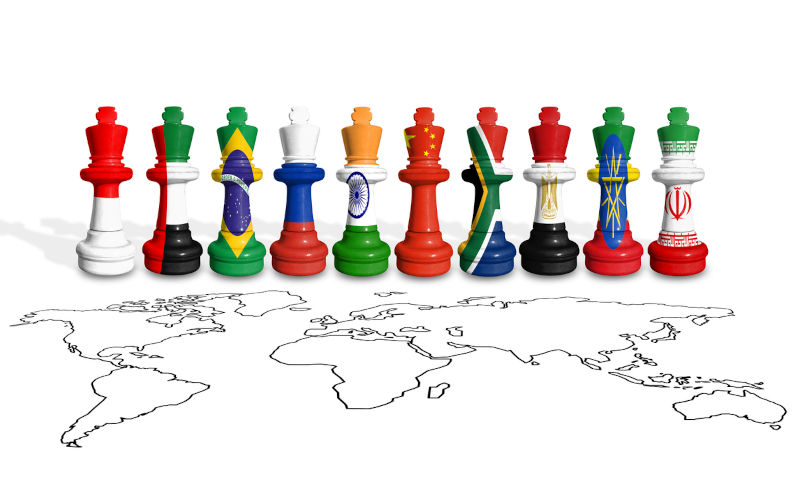Trump’s attacks on BRICS could strengthen its cohesion
August 23, 2025
President Donald Trump, exploiting US geopolitical heft and market power, has ushered in “ a new world order of tariffs”.
On 30 July, he imposed 50% tariffs on more than half of Brazilian exports. The mercurial president’s ire was directed at the “witch hunt” against Brazil’s former president, Jair Bolsonaro.
At various times, India’s prime minister, Narendra Modi, has embraced Trump as a “ true friend”, a “ dear friend” and a “ great friend of mine”. But tariff king Trump has no permanent personal attachments, only shifting transactional interactions in search of the next good deal for America. On 30 July, Trump imposed 25% tariffs on India. The next day, he posted on Truth Social he didn’t care if India and Russia “take their dead economies down together”. On 6 August, he announced an additional 25% tariffs as penalty for India’s purchase of Russian oil. The hefty tariffs, among the highest in the world, came despite many signals from both sides that they had been close to finalising a deal.
With such a stiff impost on India, Trump is reversing 25 years of bipartisan efforts on both sides to expand and deepen bilateral ties and build a strategic partnership. India exports about 20% of its goods to the US and experts estimate Trump’s tariffs will hit exports worth about 2% of GDP. If not resolved, the trade tiff could damage both India’s economic and US strategic ambitions.
Every country engages in foreign policy trade-offs between moralism and self-interest and also between competing interests. Not all refrain from castigating others that elevate national interests above international principles. India gives priority to the energy needs of its poor. Its quest for affordable and stable fuel is non-negotiable. To abandon the supply of Russian oil under economic and diplomatic pressure from US-led Western countries would be a betrayal of core domestic interests, morally indefensible and politically suicidal.
In addition, the threat of an extra 10% tariff against members of the non-Western BRICS grouping, of which India is a founding member along with Brazil, China, and Russia (South Africa joined later), remains.
Jorge Heine, a former Chilean ambassador in chronological order to South Africa, India and China, wrote in the China Daily last November that “the most significant geopolitical shift that has taken place in 2022-24 has been the emergence of what was once known as the Third World, that is, the developing nations, now labelled as the Global South, to the forefront of international politics". With a focus on South-South co-operation, a comment for the London-based Chatham House argued, “BRICS is less anti-Western than Russia would like”. While some analysts argue it is “ sliding towards irrelevance”, others hold that the Rio Declaration at the 17th summit in Brazil last month “underlined the basic cohesion and consensus within BRICS members on a range of issues”.
In November, then President-elect Trump called BRICS “anti-American” and warned it against any moves towards de-dollarisation, on pain of 100% tariffs. On 6 July, the president repeated the threat that any country aligning with BRICS in that effort would face 10% US tariffs. He has been deaf to explanations from all members that the group was pursuing the use of national currencies and barter arrangements internally, with no interest in replacing “the mighty US dollar” (Trump’s words) as the global standard. Later in July, Republican Senator Lindsey Graham warned China, India and Brazil: “We’re going to tear the hell out of you and we’re going to crush your economy, because what you’re doing is blood money.”
The bellicose rhetoric from Washington targeting BRICS merely reconfirms the wisdom and necessity of its members’ pursuit of strategic autonomy that is subordinate neither to Beijing nor to Washington. On 8 August, Modi had “a good and detailed conversation” with Russian president, Vladimir Putin, on the phone. The two leaders reaffirmed their commitment to further deepen the special and privileged strategic partnership between India and Russia. A day earlier, Modi spoke to Brazil’s president, Lula da Silva, on global issues, including Trump’s 50% tariffs on both countries.
On the same day as the Modi-Putin talks, China announced that Modi had confirmed attendance at the Shanghai Co-operation Organisation summit in Tianjin at the end of August. He will hold discussions with President Xi Jinping on the sidelines of the summit. Modi’s last visit to China was in June 2018. Chinese foreign minister, Wang Yi, visited India on 18-19 August and held meetings with his counterpart S. Jaishankar and Modi. The visit was very productive, with China and India reaching agreements on resumption of direct flights, trade and investment initiatives and three new mechanisms to manage border-related issues. After five years of border tensions, they are making progress in rebuilding bilateral ties.
In response to a question on India’s policy on Ukraine at the Globsec forum in Slovakia in June 2022, Jaishankar had said, “ Europe has to grow out of the mindset that Europe’s problems are the world’s problems but the world’s problems are not Europe’s problems”. The comment resonated across the Global South.
The BRICS grouping, which has expanded and now also includes Egypt, Ethiopia, Indonesia and the United Arab Emirates, represents their geopolitical-cum-geohistorical voice in world affairs. At a time when the world is shifting into a period of multipolar multilateralism, Trump’s anger-fuelled attempts to coerce India and Brazil into abandoning BRICS could instead cement the group’s cohesion as the vehicle for democratising the architecture of international financial governance. In vindication of the law of unintended and perverse consequences, Trump’s attacks on the BRICS could accelerate the very geopolitical realignment that so irritates the American president.
Republished from Toda Peace Institute, 21 August 2025
The views expressed in this article may or may not reflect those of Pearls and Irritations.


